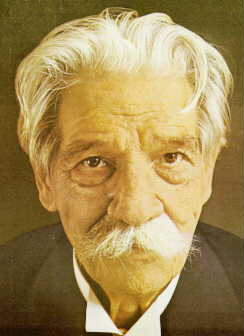"What we seem to forget is that, yes, the sun will continue to rise and set and the moon will continue to move across the skies, but mankind can create a situation in which the sun and moon can look down upon an earth that has been stripped of all life."
Thus, the warning of Albert Schweitzer (1875-1965), minister, theologian, great organist and rebuilder of historic European organs, author, physician, missionary, 1952 Peace Nobelist. (Esther and I met this great, sweet man on his visit to New York City in 1951. He autographed his photo for Esther.)
Born in Alsace, son of a Lutheran Pastor, Albert Schweitzer studied the organ with the noted Charles-Marie Widor, becoming an acclaimed interpreter of the work of Johann Sebastian Bach. While still a student in 1896 (at age 21), Schweitzer made his famous decision to live for science and art until he was 30; then devote himself to serving humanity. In 1899, he earned his doctorate on Kant's philosophy of religion. In 1905, Schweitzer published his authoritative study of Bach: in 1906. an essay on organ design; also in 1906, Schweitzer published, The Quest of the Historical Jesus, a revolutionary work on New Testament criticism that shaped Western liberal theology.
Keeping his vow, he studied medicine, taking another doctorate, and resigned from his university. In 1913 Dr. Schweitzer went to the mission station of Lambarene, French Equatorial Africa. With his wife, Helene Bresslau, he founded a hospital to serve the native populace. He equipped and maintained the hospital by his own income and energy, only later supplemented by gifts from individuals and foundations from around the world. He described his work in Lambarene as a service "not of benevolence but of atonement." And he wrote: "I am certain and I have always stressed that the destiny of mankind is to become more and more humane."
You're watching the work of Schweitzer whenever you watch an episode of M*A*S*H on TV.
You see, Schweitzer insisted upon adapting his missionary Hospital in Lambaréné,
French Congo -- now Gabon -- Africa, to the simple life of his African patients and their
relatives. But this horrified the Medical Profession at that time, saying it was not
sufficiently antiseptic. Schweitzer persisted and his Hospital became the model for the
"mobile hospital units" that prepped for hospitals in the Korean "Police Action", as seen in the
movie, M*A*S*H, and the TV series.
After receiving the 1952 Nobel Peace Prize, Schweitzer used his Nobel Laureate position to speak out against nuclear weapons testing. He died at Lambarene in 1965.
Here is Schweitzer's famous "Reverence-for-Life Ethic": "I am life which wills to live, in the midst of life which wills to live.... The will-to-live is everywhere present, even as in me. If I am a thinking being, I must regard life other than my own with equal reverence, for I shall know that it longs for fullness and development as deeply as I do myself. Therefore, I see that evil is what annihilates, hampers, or hinders life... Goodness, by the same token, is the saving or helping of life, the enabling of whatever life I can to attain its highest development.... Ethics consist in my experiencing the compulsion to show to all will-to-live the same reverence as I do my own. A man is truly ethical only when he obeys the compulsion to help all life which he is able to assist, and shrinks from injuring anything that lives....An absolute ethic calls for the creating of perfection in this life. It cannot be completely achieved; but that fact does not really matter. In this sense reverence for life is an absolute ethic. It makes only the maintenance and promotion of life rank as good.... At times we have to decide arbitrarily which forms of life, and even which particular individuals, we shall save, and which we shall destroy. But the principle of reverence for life is nonetheless universal and absolute."
When Dr. Schweitzer returned from travels to his Hospital, he would be welcomed by his friend,
Parcifal the Pelican. (Image from Albert Schweitzer Institute for the Humanities, http://
www.schweitzerinstitute.org/Mindex.htm.)